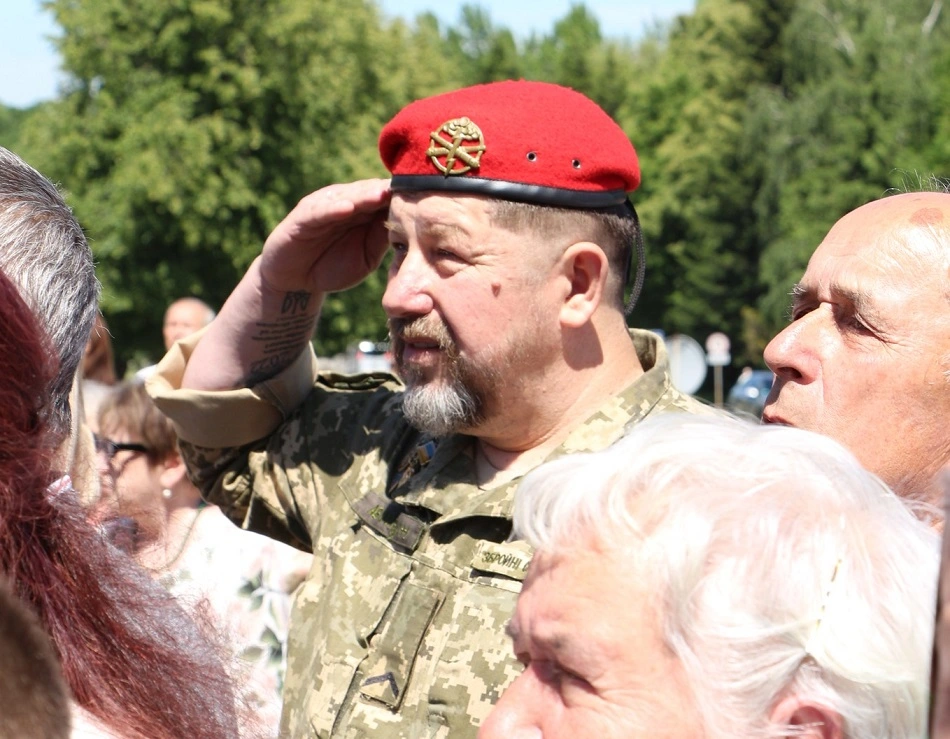Truskavets’ veteran assistant helps families navigate grief and bureaucracy.
As reported by DROBRO, citing local authorities, Victor Sarnovsky serves as a social work specialist and veteran assistant at the Truskavets City Social Services Center, led by Director Nadia Onats. A former soldier and father of two servicemen, one of whom tragically died, Sarnovsky is a well-known figure in Truskavets, having served as a deacon at the Church of the Intercession of the Blessed Virgin Mary before Russia’s full-scale invasion. His personal experience and empathy make him ideally suited to support veterans and families of fallen or missing soldiers. Below is an exclusive interview with Victor Sarnovsky.
How long have you been working as a veteran assistant, and what are your main responsibilities?
Glory to Jesus Christ! I’ve been in this role for eight months. My priority is supporting veterans, families of fallen Defenders, and those with missing loved ones. This includes helping with paperwork, advising on benefits and payments, and providing psychological support. We, the center’s staff and leadership, act as a bridge between authorities and those in need, striving to resolve their issues as effectively as possible.
What are the main challenges for veterans, families of the fallen, and active servicemen today? Can local authorities always address these issues?
The most pressing concerns are health, rehabilitation, housing, and employment. For families of the fallen, missing, or captured, it’s about seeking truth, justice, and community support. Local authorities have taken steps to help, but resources are often limited.
The issue of missing soldiers is particularly painful, with families left uncertain about their loved ones’ fates. What steps do you recommend for these families?
First, officially register the disappearance. Then, engage with the Coordination Headquarters, the International Committee of the Red Cross, and other state or public organizations. As social workers, we guide families through this process so they don’t face their grief alone.
You served in the Ukrainian Armed Forces, and your son Dmytro was killed in action. This makes you uniquely qualified for this role. Is it easy for you to do this work, and do you always find common ground with veterans or families?
We haven’t mentioned my eldest son, Mykhailo, who, as a border guard in 2014, fought against Russian-backed separatists in the Donetsk Border Guard’s area of responsibility. He remains an active serviceman. As for the work, it’s straightforward because I share their pain. When asked, “Were you there?” I can say, “Yes.” That breaks down barriers, brings smiles, and fosters understanding—we share the same tears. From there, we have constructive conversations to address their concerns. It’s not always easy; my own grief is ever-present. But it gives me the strength to better understand those who come to me. I know what they need and strive to be there not just as an official but as someone who’s lived through it.
There’s often discussion on social media about insufficient recognition of fallen Heroes. Is Truskavets doing enough to honor them, or is there more to be done?
I’ve said at many meetings that the respect and sensitivity shown by Truskavets’ social services and city council toward war-affected families are rare. Our fallen Heroes have been posthumously awarded state orders and district council honors. The Truskavets community has created an Alley of Glory and municipal awards, and the social services center, with city funding, is producing a 10-minute film with a QR code, “Memory of Ukraine,” for each fallen Defender’s family. Much has been done—memorial plaques, services, the Alley—but there’s always room for more. Honoring them shouldn’t just be official events; it must live in the community’s daily life. Let’s pause now, await Victory, and when all prisoners return and the missing are found, we’ll build a grand monument worthy of their sacrifice.
Will your work become easier or harder after active combat ends, a ceasefire, or peace? What’s the toughest part now?
I expect our work will become more challenging. The return of hundreds of thousands of veterans will bring issues of reintegration, treatment, employment, and other social needs—a massive challenge for communities and the state.
Can you share examples of how you’ve helped people who came to you?
Our center’s principle, and mine as a veteran assistant, is confidentiality, so I won’t share names or details. We maintain strong ties with families of fallen Defenders through meetings, psychological workshops, and trips. We have similar connections with many families of the missing, though some are less engaged with the center. I urge anyone facing issues with missing or captured loved ones, or other military-related concerns, to visit us at Chornovola Square, 2, first floor. We’re ready to help, no matter the challenge.
A delicate issue: some politicians, whether in power or opposition, try to exploit veterans or soldiers for their agendas, manipulating sensitive topics like deaths, benefits, or burials. How can we counter this?
The most important thing is to prevent anyone from manipulating our pain. Families must know their rights, and the community must ensure the sacred names of our Heroes aren’t used for self-aggrandizement. Our duty is to keep their memory pure.
Thank you for the conversation.
Thank you. Glory to Ukraine!
